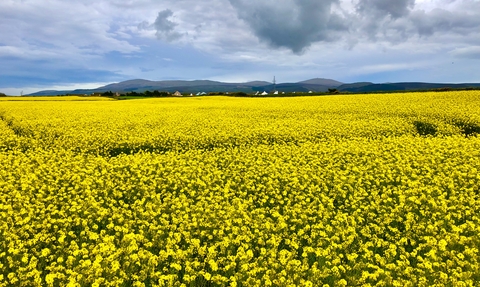
Graham Makepeace-Warne
Agri-Environment Scheme - Skeim y Çhymmyltaght Eirinagh

The Biosphere Isle of Man Environment Award for 2022 went to the entire farming and farming support community, for their wholehearted uptake of the DEFA Agri-Environment Scheme, delivered in partnership with Manx Wildlife Trust.
In its first year alone, 160 farm businesses participated and almost £1.5 million was committed to initiatives that improve habitats for nature on farmland!
Manx Wildlife Trust are pleased to be the Delivery Partner for the Manx Agri-Environment Scheme and enjoy working with the Island’s farmers to make our farmland richer in wildlife whilst ensuring continued financial sustainability for the sector.
MWT are no stranger to the agricultural sector: we own and manage 28 nature reserves across the length and breadth of the Island, along with the Calf of Man on behalf of Manx National Heritage. These reserves extend to 1,135 acres (459ha), of which almost 300 acres (121ha) are farmed. Reflecting the important link between Manx agriculture and Manx biodiversity, of our 28 reserves plus the Calf, 18 (62%) are managed for biodiversity using grazing with farm animals, including with our own small flock of native Manx Loaghtan sheep. We also grow a large volume of traditional, no input, species rich and high-nutrition hay which is used as fodder by many agricultural businesses Island-wide.
This webpage is our Agri-Environment hub for farmers and contains all the information and links that you will require in order to make best use of the scheme for your farm business.
This video is a recording of our Agri-Environment Scheme launch for farmers held on 5 October 2021. With a presentation from MWT Agri-Environment Officer, David Bellamy, and a Q&A session with David, Andy Cooper & John Harrison from DEFA and Caroline Perry from Island Land-Based Services Ltd.
NEW! You can find the slides from the January 2023 Agri-Environment Update Event held at the Centenary Centre, Peel here, and the results of the feedback here!
What is the Agri-Environment Scheme?
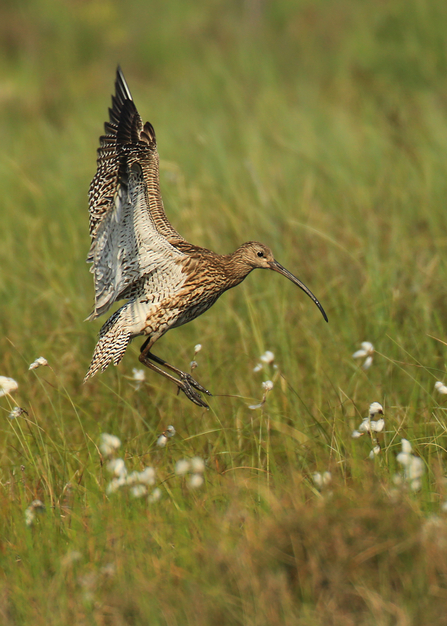
'The recovery of the Curlew, a declining Manx farmland bird, will depend on the AES.’
Credit - Jon Hawkins - Surrey Hills Photography
The vision of the Isle of Man Agriculture Strategy 2019-2029 is to:
"Sustain a vibrant Agriculture sector, enabled to deliver a reliable and profitable food chain,
while maintaining and enhancing the Island’s natural environment and capital."
In order to deliver this vision, Tynwald has approved the umbrella Agriculture and Fisheries Grant Scheme. One of the six elements of this is the Agri-Environment Scheme, which has an annual rolling budget of up to £2 million and runs in tandem with the existing Agricultural Development Scheme flat-rate area payments.
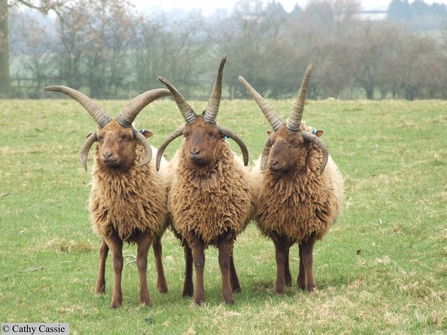
Our ancient Loaghtan breed reflects the longstanding relationship between Manx farming, culture and landscape. The AES will reward farmers for their role as guardians of our landscape.
Credit - Cathy Cassie
The Agri-Environment Scheme is completely voluntary and open to DEFA-registered Active Farmers only (whether tenant or owner-occupier). You must have an existing Agricultural Business number (i.e. AB0001) to participate in the Agri-Environment Scheme. The Scheme seeks to help achieve the vision of the Agriculture Strategy by focusing on the following areas: the Environment, Supporting Active Farmers and Productivity.
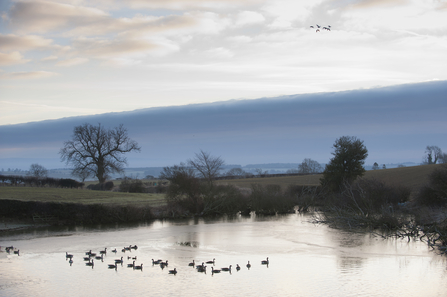
Farmland dubs are critical to our biodiversity and as a farm water supply; the AES can pay for their restoration and creation.
Credit Paul Harris/2020VISION
The Agri-Environment Scheme therefore aims to: Provide support for targeted initiatives that produce conserved and cherished landscapes, enhance biodiversity, sequester carbon and improve water quality, reduce flooding and reduce greenhouse gas emissions as part of the Climate Change agenda.
The Scheme is completely voluntary and can be joined or left at any time. For a detailed description of Scheme eligibility please see the latest AES Handbook.
Why are Manx Wildlife Trust involved?
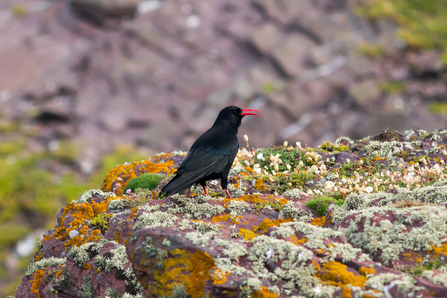
Our iconic Chough benefit from low-cropped, low-input permanent pasture along the coast, a Manx 'Priority Habitat'. Coastal farmers can now apply to receive reward for managing their grazing to the benefit of Chough.
Credit - Mike Snelle
Manx Wildlife Trust sees the AES as a fantastic opportunity for us to work more closely with Manx farmers and Government to together make large, long-term gains for nature across the Island at landscape-scale.
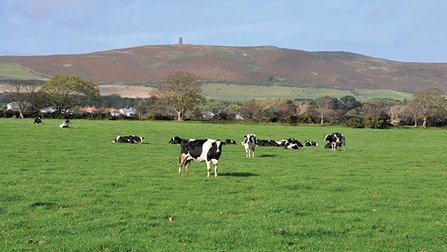
The AES supports the creation of clover-rich swards, to the mutual benefit of wildlife, soil productivity and milk production.
Some 72% of the Isle of Man is under agriculture, compared to just 0.4% which we manage as a Manx Wildlife Trust Nature Reserve. Farmers are therefore the guardians of our countryside and through our delivery of the AES, we aim to have a much greater impact for nature across our Island by working closely with our Manx farming community.

The Upland Stewardship element of the AES will play a large part of our Island’s climate change strategy.
MWT understand that farms are businesses and that farmers need to generate profit in order to survive, whilst also feeding the nation. We empathise with that and believe that nature-friendly farming can often be as profitable and productive as other farming methods. We aim to maximise the uptake and impact of the AES to enable more of that to take place. We are aware of the possible challenges involved in the maturation of this Scheme and know that there may not be many quick gains, but the longer-term potential to benefit the Manx environment is huge and that is our vision. MWT believes that working more closely with other key stakeholders in the countryside is fundamental to providing the scale and pace required to tackle the massive issues of climate change and biodiversity loss.
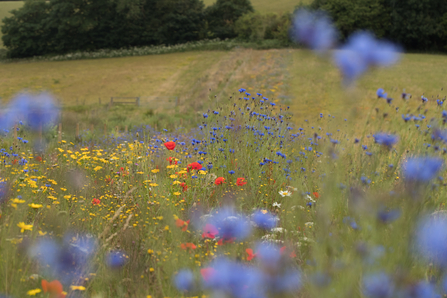
The AES has Initiatives to benefit pollinators, which in turn will benefit farmers
Credit - James Alder
Ultimately MWT believe that the Island has the potential to be ‘what good looks like’ in terms of sustainable agriculture and we are working with DEFA and farmers to help realise that.
As Delivery Partner, MWT are contracted by DEFA to deliver support to this important scheme. Our support includes the employment of a full-time Agri-Environment Officer (David) and a part-time AES Administrator (Laura) along with mileage travelling to and from farms. MWT is a not-for-profit charity and our full annual accounts can be accessed via our website.
How does the Scheme work?
The Scheme was designed, and is owned, by DEFA, with the on-farm support delivered by Manx Wildlife Trust. In addition, external to MWT or DEFA, specialist agronomy advice is provided by Caroline Perry of Island Land-Based Services Ltd. The Scheme is open to all Active Farmers and applicable to all of their ADS-declared landholding, whether tenanted or owner-occupied.
MWT FARM VISITS
You can request an unlimited number of no charge farm visits from MWT at any time, indeed for capital projects we recommend farmers involve us at the planning stage and prior to any application being made. During an MWT farm visit we will discuss existing habitats and wildlife of interest on your farm and offer advice on the ambitions of the farmer in relation to the Scheme, ensuring you are aware of all the initiatives you are eligible for. We can even assist with drafting application forms and creating required application maps. It is important to note that MWT are not DEFA Field Officers/farm inspectors and will never try to force a farmer to do anything they do not want to do (it is after all a voluntary scheme). Neither do we designate land for ASSI status (this is exclusively a DEFA function).
APPLICATION & APPROVAL
- Application (active farmer initiatives). Most initiatives can be applied for on a single form which is included within your annual ADS, AES and Census paperwork (received in the post at the end of each April, with a return deadline of 11th May). After submission forms, MWT or Caroline Perry will contact applicants at a suitable time of the year to inspect the Management Conditions included in the AES Handbook are being met and make a recommendation of payment to DEFA.
- Application (capital projects and management of priority habitats). Capital projects (new hedges, new dubs etc) and the management of existing priority habitats (fungi-rich grasslands, traditional late-cut hay meadows etc) have bespoke application forms owing to their more complex nature. It is recommended that farmers contact MWT directly before applying, as we can assist with the forms. Under expenditure, self-labour is acceptable and this should be quoted and later internally invoiced (we recommend that you base such applications on the latest NAAC farm contractor charges). DEFA will pass all capital project applications to MWT for an ecological approval, so involving MWT at the drafting stage can omit this step.
- Deadlines. For the Scheme Year 2023/2024 there will simply be two deadlines, a summer deadline (11th May 2023) for most initiatives and a winter deadline (for the winter-only arable options). Capital projects can be applied for at any time.
- Approval (capital projects). DEFA endeavour to review the farmer’s application and MWT's recommendations within 4 weeks and either approve or reject the application. Successful applicants will receive a Claim Form outlining the full expenditure recoverable and the required Management Conditions. In the event of a refused application, you will be informed in writing and have a right to appeal.
- Undertake the project. Once a capital project is approved via a Claim Form, a farmer may undertake the initiative. In line with all DEFA grants, farmers must pay for initiatives up front and claim back in arrears. Part-claims for larger projects are allowed.
- Payment. The farmer must return their Claim Form to DEFA, including related invoices and photos of works. DEFA will review the Claim Form and may direct MWT to undertake a check (at a time convenient to you) that the Management Conditions have been met. Capital projects are paid out on the next available monthly payment run. Active farmer initiatives are paid at the end of the financial year in arrears. If payment is rejected for any reason, you have a right to appeal.
What can I apply for?
There are over 40 specific Initiatives outlined in the Handbook which cover arable and pastoral farming across both the lowlands and uplands. Initiatives include the creation of desirable permanent habitats (e.g. dubs, hedges) and beneficial transient habitats (e.g. winter stubble), along with the enhancement of existing habitats (e.g. repairing sod hedges or drystone walls).
Additionally, money is available for the beneficial management of existing habitats and diffuse pollution management. Furthermore, there is a wide range of agricultural initiatives (soil sampling, management plans, lime, clover, organic conversion etc). Grants for wildlife nest boxes and educational visits also exist. Finally, for Above Mountain Line land there is an Upland Stewardship option that in 2022-2023 gives a payment for the drafting/renewing of a sustainable upland habitat management plan and is applicable to land in Good Agricultural and Environmental Condition only.
PRIMARY INITIATIVES
The following are considered to be ‘Primary Initiatives’ and do not require a farm visit from MWT, however we will be happy to visit on request. To apply for these, every farmer is sent the Primary Initiatives Application Form in late April along with the annual ADS paperwork.
Should you be registering as an Active Farmer after May 2022, please complete the Primary Initiatives Application Form as soon as possible.
- Winter Stubbles
- Winter Fodder Crops (grazed)
- Traditional Spring Cropping
- Conservation Headlands
- Unharvested Cereals
- Biennial Wild Bird Seed/Wildflower Strips
- Buffer Strips on Cultivated Land
- Crop Nutrient Management Plan
- Manure Management Plan
- Infield Grass Strips
- Winter Cover Crops (not grazed or cultivated until 15th February)
- Legumes for Combining or Harvested Forage
- Legume Rich Swards for Grazing (Clover Leys)
- Integrated Pest Management Plan
- Herd/Flock Health Plan
- Key Performance Indicators (Productivity Benchmarking)
- Herbal Leys
CAPITAL INITIATIVES
**Farmers must not start any capital initiatives until full written approval has been given by DEFA. No payments can be made for any items of expenditure or any capital work commenced prior to formal Government approval in writing.**
The following are considered to be ‘Capital Initiatives’ and require a bespoke application form containing more details. Forms are available from the DEFA Agri-Environment webpage. Habitat creation and Farmer Initiatives will require a site visit by MWT, who can help assist with the paperwork. While farmers are able to apply to DEFA directly, it is strongly advised that applications apply via MWT as we have much experience in ensuring applications are completed with sufficient justification to ensure speedy approval by DEFA officers.
- Woodland Planting
- Dubs, Scrapes and Wetland Habitats
- New Hedge Planting
- Farmer Initiatives (for any ideas not covered elsewhere)
- Hedge Enhancement
- Hedge Management
- Dry Stone Walling
- Manx Sod Hedging
- Control of Invasive Species
- Soil Sampling
- Lime Grant
- Certified Organic – Conversion and Management
- Pest and Disease Monitoring
- Delivering a Unique and Desirable Habitat
- Wildlife / Nest Boxes
- Educational Visits for School Children
- Upland Stewardship Scheme
After the farm visit, the farmer (or us on the farmer’s behalf) will send the completed application form to DEFA. Once this has happened, Manx Wildlife Trust will also submit their ecological recommendations to DEFA to ensure there is ‘Net Biodiversity Gain’.
Manx Wildlife Trust are pleased that DEFA have ensured maximum flexibility for farmers by including for Farmer Initiatives, which allows any farmers to apply for anything not included elsewhere. This is over and above similar schemes in neighbouring jurisdictions and allows for the ambitions of each farm business to be met by tailoring the scheme to each individual farm when required.
Meet the team
There are 21 staff within the MWT team (part/full-time paid staff and permanent volunteers) across both the Isle and Calf of Man. Our staff and volunteers manage an incredible network of 28 nature reserves across the Island, provide education and outreach to schools, undertake research and monitoring and provide highly specialised ecological consultancy services and practical conservation advice. Our team includes highly skilled botanists, ecologists, biologists and both upland and lowland land managers. One of the strengths of our delivery of the AES is that we can call upon any of our staff to provide specialist advice & guidance when required by Manx farmers – at no cost to the farmer. We have a single Agri-Environment Officer who spearheads our AES delivery:
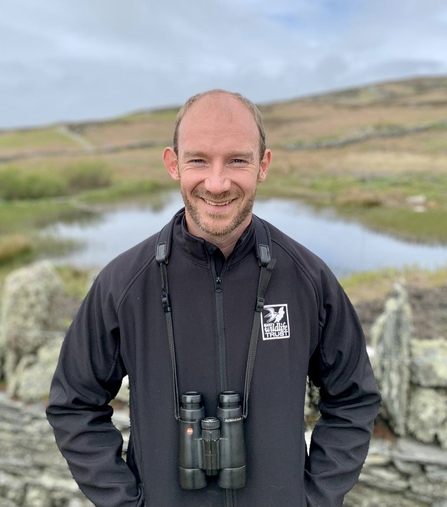
David Bellamy
David Bellamy BSc (Hons) MA was born and raised on the Island, David joined MWT in April 2021 in the new role of Agri-Environment Officer. David studied Ecological Science & Conservation Management at the University of Edinburgh and has since gained a wealth of practical land management experience on MWT’s network of nature reserves across the Isle of Man. His main area of interest is as an avian ecologist.
David’s role is to provide advice, assistance and support to all Manx farmers on the ins-and-outs of the Agri-Environment Scheme, including the application process, specific initiatives and providing farm-specific advice on nature-positive farming. David also works closely with DEFA regarding approvals and assurance. You can contact David on: David@mwt.im
David's published articles:
Country diary: We find four globally rare fungi by lunchtime
Country diary: An all-white hen harrier, ghosting along the cliffs
Country diary: Far from roar of the TT, I find wildlife bliss
Country diary: No weeds, no tree sparrows – only a few are hanging on
Country diary: The choughs patrol the cliffs, cawing at everything

Our iconic Chough benefit from low-cropped, low-input permanent pasture along the coast, a Manx 'Priority Habitat'. Coastal farmers can now apply to receive reward for managing their grazing to the benefit of Chough.
Credit - Mike Snelle
Caroline Perry
Caroline Perry of Island Land-Based Services is also involved in the delivery of the Agri-Environment Scheme, bringing a wealth of experience in farm science. Caroline is not part of MWT but is working alongside us to ensure our wealth of wildlife knowledge is equally matched by her excellent background in food production and productivity.
Farmer Library
Find the list of books farmers can borrow here! These cover a wide variety of topics from farmland wildlife, soils and nature-positive farming.
If you would like to borrow a book please contact David, our Agri-Environment Officer.
External Links - Policy
Agriculture and Fisheries Grant Scheme 2016
DEFA Agri-Environment Scheme website
Nutrient Management Plan - Information Sheet
Useful Links
https://www.worldwildlife.org/industries/sustainable-agriculture
https://www.rspb.org.uk/our-work/conservation/conservation-and-sustaina…
https://www.wildlifetrusts.org/farming
https://www.soilassociation.org/
https://www.nffn.org.uk/
